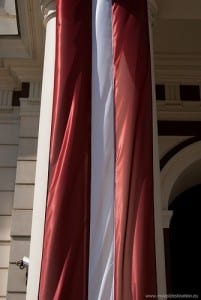Latvia’s elections: Can there be harmony without Harmony?
By Sean L Hanley, on 8 October 2014

Photo : Guillaume Speurt CC BY-SA 2
Latvia held parliamentary elections on 4 October. Licia Cianetti writes that while the elections saw Harmony – the centre-left party representing the country’s Russian-speaking minority – win the most seats, the results will most likely see the incumbent government led by the centre-right Unity party continue in power. The steady fall in turnout experienced in recent elections also suggests that despite backing the ruling parties, Latvian citizens are far from content with the status quo.
The parliamentary elections that took place in Latvia on 4 October did not hold many surprises and are likely to return the incumbent governing coalition to power. The results, announced by the electoral commission soon after the closing of the polls, saw the Russophone-friendly, centre-left party Harmony once again in first place, with 23 per cent of the vote and 24 of the 100 seats in the Saeima (the Latvian parliament).
This is a bitter first place, though, as the party lost 7 seats compared to the last elections in 2011. The governing, centre-right party Unity came a close second with a little less than 22 per cent of the vote and 23 seats. This is an increase from 20 seats in the last elections, but also shows that the merger with the disbanded Reform Party (which in 2011 got second place with 22 seats) did not bring significant electoral returns.
The nationalist National Alliance (NA), also in the incumbent government, had their best result yet with almost 17 per cent of the vote and 17 seats, up from 14. The other governing party, the Union of Greens and Farmers (ZZS) also had a strong showing with 19.5 per cent of the vote and 21 MPs (up from 13 in the previous election). Alongside these four parties, which were all represented in the outgoing Saeima, two new parties entered parliament: No Sirds Latvijai (From the heart of Latvia, NSL) and Latvijas Reģionu Apvienība (Latvian Association of Regions, LRA). NSL gained just under 6.9 per cent of the vote and 7 parliamentary seats. LRA gained just under 6.7 per cent of the vote and 8 seats (the distribution of the votes by constituency accounts for the less-than-proportional seat distribution). The Table below shows the full results.
Table: Results of the 2014 Latvian parliamentary election

Note: Vote shares have been rounded to one decimal place. There are 100 seats in the Latvian Parliament. For more information on the parties see: Harmony, Unity, Union of Greens and Farmers (ZZS), National Alliance (NA), From the Heart of Latvia (NSL), Latvian Association of Regions (LRA).Source: CVK
Six out of the 13 parties that contested the elections, therefore, entered parliament. Of those that remained out of the Saeima, the ethnic party Latvia’s Russian Union (LRU, formerly For Human Rights in a United Latvia) was the most successful with a little less than 1.6 per cent, but still far from the 5 per cent threshold. Another notable ‘loser’ of these elections was the (in)famous oligarch Ainārs Šlesers’s new formation Vienoti Latvijai (United for Latvia), which lined up a list of former ministers and prime ministers but garnered less than 1.2 per cent of the vote. Neither party was present in the outgoing parliament and neither was expected to make it into the new Saeima, according to pre-electoral polls. The results of the European Parliament elections in May (when LRU unexpectedly retained its MEP), however, indicated that surprises could not be completely ruled out. (more…)
 Close
Close


